Please Take Note: This is a review of the game’s final prototype. The art, game bits, and the rules discussed are all subject to change. The game is being reviewed on the components and the rules provided with the understanding that “what you see is not what you might get” when the game is published. If you like what you read and want to learn more, we encourage you to visit the Kickstarter campaign. Now that we have all that disclaimer junk out of the way, on with the review!
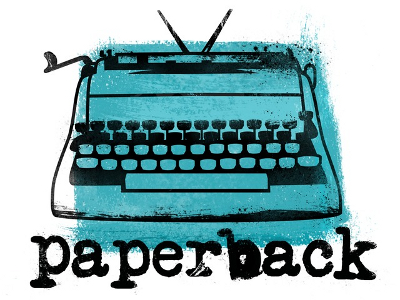
The Basics:
- For ages 8 and up
- For 2 to 4 players
- Approximately 45 minutes to complete
Geek Skills:
- Counting & Math
- Logical & Critical Decision Making
- Reading & Writing
- Strategy & Tactics
- Hand/Resource Management
Learning Curve:
- Child – Easy
- Adult – Easy
Theme & Narrative:
- Collect the right cards and spell big words in this intuitive deck-building language game
Endorsements:
- Gamer Geek mixed!
- Parent Geek approved!
- Child Geek mixed!
Overview
The idea of being a novelist has always been alluring to me. I romantically dream of a life full of literature, sweater vests, and luncheons with poets and other writers. Conversations would be deep and meaningful as we sipped our expensive coffees. In reality, being a successful writer means lots of long hours, rejection letters, and moments of pure panic as you struggle to write. In this game, players will get to experience the trials and tribulations that come with attempting to write the next great novel!
Paperback, designed by Tim Flowers and to be published by Gabob, will reportedly be comprised of 200 cards, but our set only included 166 cards. Out of those cards, there were, 20 $1 Letter cards, 8 $2 Letter cards, 15 $3 Letter cards, 16 $4 Letter cards, 12 $5 Letter cards, 12 $6 Letter cards, 14 $7 Letter cards, 8 $8 Letter cards, 7 $9 Letter cards, 2 $10 Letter cards, 4 Common Vowel cards, 20 “Draft” Wild cards, 8 “Western” Wild cards, 8 “Sci Fi” Wild cards, 8 “Romance” Wild cards, and 4 “Best Seller” Wild cards. A small number of tokens were also be included for a game variant. But the game designer plans on expanding the game further through Kickstarter overfunding awards, meaning that the final inventory of the game has yet to be determined. As this is a review of a yet to be published game, we will not comment on the game component quality. The version of the game we received was easy to use, easy to read, and worked very well with all our players.
Getting Ready to Write
To play the game, first separate the cards by type. Build piles of cards using the victory point values and the cash amounts as a guide. For example, you’ll have a pile for every Letter card value and a pile for every Wild card value. Note that the Wild cards have both a victory point value and a cash value. Use the victory point value to determine which cards should be grouped together.
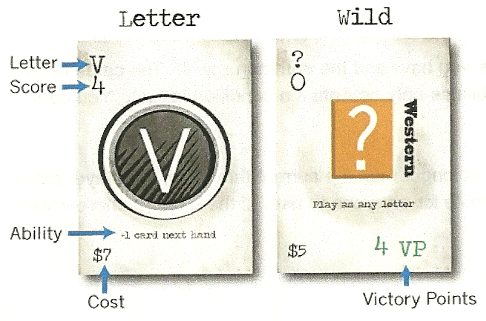
Second, each player gets a starting deck comprised of the same type and number of cards. To each player give 1 “R”, “S”, “T”, “L”, and “N” $1 Letter card. Then give each player 5 “Draft” Wild cards. Any remaining “Draft” and $1 Letter cards not dealt to players are removed for the duration of the game. Players should shuffle their deck, place it to their right, face-down, and then draw 5 cards from the top. This is the player’s starting hand.
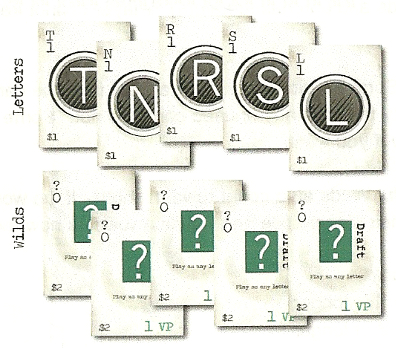
Third, shuffle the $2, $3, $4, $5, $6, and $7 Letter card piles and then place them face-up in a row in the middle of the playing area. Shuffle together the $8, $9, and $10 Letter card piles together to form one pile and place it in the row with the other Letter cards, face-up. Draw the top card of each deck, except the $2 Letter card deck, and place it underneath its pile, face-up. These are the alternate cards that can be purchased during the game.
Fourth, under the alternate cards, place the Common Vowel, “Western”, “Sci Fi”, “Romance”, and “Best Seller” Wild piles, face-up. Make sure that the “Western”, “Sci Fi”, and “Romance” piles contain exactly 2 cards each for every player. The “Best Seller” Wild card pile should only contain 1 card per player. For example, in a 2 player game, the “Western”, “Sci Fi”, and “Romance” Wild card piles would contain 4 cards each and the “Best Seller” Wild card pile would only contain 2 cards. Place the unused Wild cards aside as they are not used for the duration of the game. Once completed, your playing area might look something like the following.
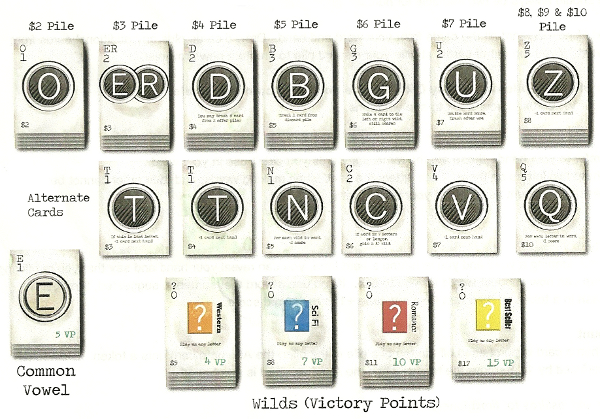
That’s it for game set up. Let’s write a book!
Building Literature
The game is played in turns with no set number of turns or rounds in a single game. A player’s turn is comprised of 5 steps that are summarized here.
Step 1: Create a Word
The player now attempts to create a word using their Letter and Wild cards in their hand. Letter cards that have 2 letters on them represent both letters in the order in which they appear. Letter order cannot be changed. The top Common Vowel card can be used during the word creation process for free. The player places their Letter cards down in front of them that they will use. Note that some Letter cards have special abilities. These are triggered once the card is played, but some special abilities are only triggered if certain criteria are met. Players also have the option to not trigger the special ability if they don’t want to.
Step 2: Score the Word
The word is now scored. The player adds up all the points (points are determined by the $ amount) provided by the cards. All bonuses from card abilities should be applied at this time if applicable. Player’s should also make a mental note if any special abilities will influence their next turn.
While it’s not explicitly stated in the rules, a player can be challenged on their word prior to scoring. The word should then be looked up to see if it’s valid. If it’s, super good. The player should keep going. If not, their cards are returned to their hand and they get to try again.
Step 3: Buy Cards
The player now uses their points to buy more cards. Each point is worth $1. Only visible cards on top of piles or the alternate cards can be purchased. The player can buy as many cards as they like as long as they do not go over their total points earned. Abilities that change the cost values should be used at this time. Note that some of the Letter cards have special powers. A few are listed here as an example.
- +1 Score per Letter in Word
- Trash a Card from Hand for +3 Points
- +2 Cards Next Hand
- If Word Uses All Your Cards, +2 Points
All purchased cards are placed in the player’s discard pile. If the alternate card is purchased, replace it with the top card from the pile above it. When trashing a card, it’s removed from play (we assume, as it wasn’t fully explained in our game rules, but is common practice in most deck-building games).
Step 4: Discard
The player now discards all the cards played to the table and any cards not played in their hand. The player’s discard pile should be placed next to their draw deck, face-up. If the player used a Common Vowel, they can keep it but only if they created a word of sufficient length. Kept Common Vowel cards are placed in the player’s discard pile. If the player did not, it goes back to the top of the Common Vowel deck.
Step 5: Draw
The last step on a player’s turn is to draw back up to 5 cards. If the player played any Letter cards that gave them the ability to draw more, they should do so now. If the player ever cannot draw enough cards, they should shuffle their discard pile and flip it over to create a new draw deck.
This concludes the player’s turn. The next player in turn order sequence going clockwise now goes starting with step 1 above.
Ready to Print!
The game continues until two of the Wild card piles are gone or there are no more Common Vowel cards remaining. Each player now adds up all their victory points in their deck (not the $ amounts). The player with the most points wins the game!
Game Variants
Our rules came with the two following game variants.
- Bounty: this optional rule allows the player to use the included game tokens. These can be awarded to opponents who help another players create a word. The help must be asked for by the player and the player is not obligated to use any words suggested. If they do use a suggested word, a token is given to the opponent who assisted. This token can be used to give a one-time +1 $ bonus to a word.
- Discount: when the top Letter card is purchased from the pile, the alternate Letter card under it receives a token. Each token stacked on the alternate Letter card reduces its cost by -1. Tokens are removed and placed to the side of the playing area when the alternate Letter card is taken.
To learn more about Paperback, visit the game’s Kickstarter campaign.
Prediction
If Scrabble and Dominion had a whirlwind romance, rushed off to Vegas to get married, and then consummated their love that very night, Paperback would be born about 9 months later. The game, just based on the rules and the game components, is a perfect blend of letters and wordplay with deck-building and variable card abilities thrown in for good measure. I’ve honestly never come across a word game like this and I was intrigued from the very start.
Word games tend to polarize the gaming community. There are very few who can “take it or leave it”. Most of the time, players hate or love word games with a passion. This is going to make it a bit difficult to get an unbiased and objective point-of-view of the game from many of our players. And while the learning curve for the game is slight, even the quickest study will always be beaten by a player who has a larger vocabulary and stronger spelling skills. This is one of those games, like any other word, language, or knowledge based game, that a player who has more educational experience will be able to dominate a player with more gaming experience.
I predict good things at the Parent Geek level and mixed results at the Child and Gamer Geek level. The Parent Geeks will most likely approve the game for its seemingly casual game play and the educational benefits. I cannot imagine a more worthwhile family game for those Parent Geeks who want their children to be good spellers AND good gamers. The Child Geeks, on the other hand, might not enjoy their time at the table as much as their parents. Paperback will most likely be found to be a very frustrating experience for the younger players who simply cannot compete with their older and more educated peers. As for the Gamer Geeks, they tend to have very strong opinions on some very silly things. One of them is word games. I know for a fact there is a Gamer Geek who thinks Scrabble is a four-letter word. But I will also be playing Paperback with Gamer Geeks who think word games are the next best thing to butter on toast.
Teaching the game is easier than most deck-building games. I think this is because the players can see how the cards interact with each other on a very basic level right away. Every player knows you can’t spell “cat” without the letters “C'”, “A”, and “T”, for example. Spell the word and get points, but you can’t spell the word until you get the cards. Every player, from the very young to the very old, understood this without the need for us to go into great detail. The only questions we had were concerning player interaction and those came from players who were already very familiar with other deck-building games. Some of our players were dishearten to learn that Paperback is a passive game where the only way to interact with the other players is by eliminating the available cards as quickly as possible. After teaching the game to my little geek, I asked him his thoughts on Paperback so far.
“I feel like I already know how to play this game, Dad.” ~ Liam (age 8)
Very true. Any player who knows how to play a deck-building game will be able to sit down and play Paperback without issue. Let’s play the game and see if our experience with it spells “fun”. Which is at least a 13 point word, by the way.
Final Word
The Child Geeks who had a larger vocabulary and who could spell did very well with the game. Every Child Geek who did not quickly discovered that Paperback was not a game they could play at a competitive level. Like Scrabble, or any other word and knowledge based game, a player’s ability to be effective at the gaming table is largely due in part to their educational experience and not their game playing experience. At the Elementary Grade School levels (of which the Child Geeks primarily are), a player who was only 1 school year higher than their opponent had a distinct advantage. Only when the Child Geeks were roughly equally matched at an education level did the deck-building aspect of the game come into play and make all the difference. My 8-year-old, for example, knows how to play Dominion. When pitted against a foe his age that did not, he cleaned the floor with them. It should come as no surprise that Paperback had mixed levels of endorsements as a result. For those Child Geeks who enjoyed deck-building games AND who felt confident spelling words, Paperback scored high marks. For every other Child Geek, Paperback was an exercise in frustration. We recommend Paperback for any Child Geek who is in 2nd Grade or an advanced First Grader.
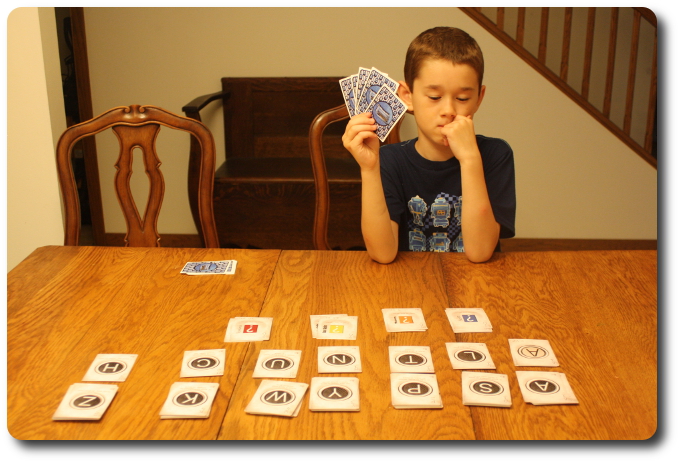
My little geeks contemplates the word he can make with the Common Vowel card
The Parent Geeks enjoyed Paperback on two levels. The first was at the family level. They saw Paperback as a wonderful family game that was fun to play and strengthened language skills at the same time. I have yet to see any game that is placed in front of this group that is one part educational and one part geek not get a strong approval endorsement. According to one Parent Geek, “this is the kind of game that I wish I had as a kid when I was learning how to spell.” The second was at their peer level. Paperback was enjoyed by the Parent Geeks as a casual and yet competitive word game. Even the non-gamers thought so and had no problem with the game’s deck-building aspect. I asked one non-gamer why they enjoyed Paperback so much when I knew they didn’t care for Dominion or other deck-building games. Her answer, “this game makes sense.” It was also interesting to observe that Parent Geeks who were strong deck-building players quickly built their “machine” that produced high scoring words every turn. The game wasn’t found to be perfect, however. The Parent Geeks would have liked to have seen more cards that provided abilities to interact with their opponents. Interestingly enough, none of the players asked for more ways to trash cards. Investing just enough in the Wild cards to have one or two in the hand each time was found to be sufficient and every card was found to be useful.
For the Gamer Geeks, this came down to liking word games or not. None of the Gamer Geeks had anything negative to say about how the game played. In fact, all the Gamer Geeks agreed that Paperback was one of the most interesting and fun word games they had played in a long time. So why the mixed endorsements? Simply put, if the Gamer Geek didn’t like word games, they didn’t like Paperback. No matter how interesting they thought the game was and how well it played, it just didn’t resonate with them. According to one Gamer Geek, “I think this is a very well designed and interesting game, but that doesn’t make it a game I want to endorse.” So be it, but let’s make certain that everyone understands that the negative votes for the game were purely based on personal game preference and had nothing to do with the game itself.
I am not pleased with some of the Gamer Geeks. While I always respect and publish their opinion, I disagree with a number of them who did not endorse the game because they simply didn’t like it. From my point of view, if you enjoyed your time with the game, that makes it a game worth while. But I also recognize that a good game is a well designed game. Even if I didn’t particularly like playing it or enjoy the game’s theme, I would still give it my endorsement if I thought it was a well designed product. Just because I didn’t like it shouldn’t imply the game’s value is somehow less. That’s just plain arrogance. But arrogance is a difficult foe because it’s both sword and shield to the person who wields it. They can block any argument against their opinion and come swinging back with mighty egotistical blows. In the end, I just stopped arguing, grumbled something like “‘that’s stupid” and got on with it.
So here are my thoughts on Paperback. I like it. I like it a lot. It’s the only word game I have played in a VERY LONG TIME that had me thinking on multiple levels. I really enjoyed the deck-building aspect as it challenged me to buy cards that I knew I could use with existing Letter cards for mega points. That is actually a lot harder than it seems because every Letter card is only as good as the other Letter cards that are in your hand. I also had to be creative when it came to maximizing the card abilities. If I did it right, my simple three-letter word scored massive points, which felt great. I think this is the closest thing to a “gamer’s word game” I have ever seen. The game play is engaging, the turns are quick, and everything I love about deck-building is seamlessly entwined with everything word gamers enjoy most, which is spelling words.
I did see one interesting game play tactic that I am not certain the game designer intended but is inherent in all deck-building games. The advanced players quickly determined there was a tipping point where their decks no longer produced words at a rate that was sufficient to win. This shouldn’t come as a surprise to any deck-builder who strives to create a “machine” that produces useful cards each and every hand. But with Paperback, it was very obvious when a player was essentially done building their deck. The same word or words were always appearing on the table. Repeatedly. Of course, this is exactly the kind of thing you want to achieve.
For those players who are looking for a deck-building game where you can come up with powerful combos, look no further than Paperback. Many of the Letter cards have abilities that have specific requirements before they can be triggered. For example, having so many letters in a word. There are also Letter cards that are only as strong as the Letter cards to their left and right. Some very interesting combos to be had that left many of players feeling very satisfied and excited. It wasn’t enough to simply be a good speller. Players had to be strong card players, too.
I highly recommend that you play Paperback using the Bounty game variant when sitting at the gaming table with Child Geeks. This gives the less experienced players who are not strong deck-builders or strong spellers the ability to ask for help that keeps things interesting. All the player’s opponents get to suggest some words that can be used and this is something of a contest of two parts. The first is the opponents attempting to out do each other in hopes of winning the token (but not too good because the word created can score points). The player, in turn, will then get some much-needed assistance, but they get to choose which of the words they want to use or none. Maybe the words being suggested triggered a unique idea that would allow the player to spell a word on their own! But if they do use a word suggestion from their opponent, they should balance what they earn with what they are giving away. It’s often times advantageous to give the token to an opponent who is not winning, even if the suggested word is worth fewer points.
In the end, the value of Paperback will be judged on a player’s preference when it comes to word and language games. I highly encourage any player who thinks that all word games are dull to sit down and play a game of Paperback. I would be very surprised if they didn’t ask for another game. And while I am unable to give Paperback the Father Geek Seal of Approval because all three of our groups didn’t endorse it, the game most certainly gets two thumbs up from me. I think Paperback is not only a very good word game, but also a very good deck-building game. I’d even go so far as to suggest it should be the first deck-building game put in front of non-gamers. It’s easy to play, easy to learn, and how to go about building an effective deck is very intuitive. This will serve to create a very solid experience base for any player who wants to explore future deck-building games. Do look into playing Paperback when you have an opportunity and say good-bye to every other word game you have ever played. You simply won’t want to play them again after getting your hands on Paperback.
This game was given to Father Geek as a review copy. Father Geek was not paid, bribed, wined, dined, or threatened in vain hopes of influencing this review. Such is the statuesque and legendary integrity of Father Geek.




where can we pick this game up at? will it be on KS?
Yes, it will be available on Kickstarter today. When the campaign has started, I’ll update this post with links to it for those who are interested and want to learn more.
Thanks for reading and leaving a comment!
Great review of what sounds like a very neat game. When I saw the endorsements, I almost stopped right there, but I’m really glad I kept reading–just like how you can’t judge a book by its cover, you can’t judge a Father Geek review by its endorsements!
I immediately thought of my older sister, who really doesn’t play board games, but could wipe the floor wih almost anyone in a game of Scrabble. I will definitely be backing Paperback.
Glad you took the time to read the entire review! 🙂
Ooh this looks interesting for sure! Your reviews are great. I know some people who this game would be a great match for.